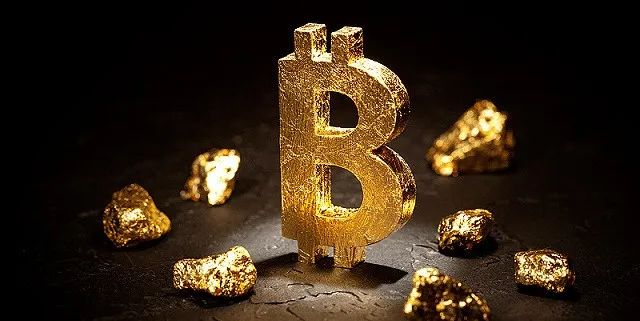Is GBTC a profitable game? Why is becoming an ETF so important?
Is GBTC a Lucrative Investment? The Significance of Its Potential Transformation into an ETFAuthor: Messin, Medium; Translator: Songxue, LianGuai
Hey guys, considering that we have spent a whole two years in a bear market, we should have enough time to prepare ourselves for the inevitable bull market. In a series of articles (I’m not sure exactly how many), my goal is to delve into different ideas that could lay the foundation for some potentially profitable plays (on the other hand, things that may be worth avoiding until the next bull market cycle really kicks off).
In this article, we’ll be discussing the Grayscale Bitcoin Trust (GBTC) and why I think it will be very interesting to watch in the coming months as it is likely to be approved (hopefully in the near future) as one of the first physically backed bitcoin ETFs.
First, let’s understand some background information…
- Crypto Carnage $51.6 Million Vanishes in October 2023 Due to Attacks, Phishing Scams, and Rug Pulls, Leaving Investors Reeling – Beosin Blows the Whistle
- Taiwan’s Biggest Crypto Money Laundering Scandal: The Billion-Dollar Shell Game Revealed!
- Introduction to the Autonomous World Case Studies of Autonomous World
1. What is GBTC? Why is it so important to become an ETF?
GBTC (Grayscale Bitcoin Trust) was launched in early 2020,
In its current form, people can invest in BTC through the issuance of shares via CEF (closed-end fund). There are several factors that hinder trusts like GBTC from being ETFs, the most important ones being:
Fixed Shares – Closed-end funds like GBTC have a fixed number of shares. On the other hand, ETFs can issue new shares or redeem existing ones depending on whether the ETF’s market value is higher or lower than its underlying asset price.
Fixed Liquidity – GBTC also has fixed liquidity, meaning the underlying asset (BTC in this case) cannot be increased or decreased from its total liquidity. On the other hand, the price of an ETF is typically much closer to its net asset value, and assets can be easily redeemed or rebalanced.
Restricted Access/Regulation – Since GBTC is not an SEC-approved ETF, it can only be traded in the over-the-counter market. Technically, institutions can still access GBTC, but it is generally considered riskier since they do not have the same transparency requirements and protections provided by the SEC.
2. Discount
One of the main reasons I and many others have been closely monitoring GBTC is its net asset value (NAV) discount – currently at -17.13%:

https://ycharts.com/comLianGuainies/GBTC/discount_or_premium_to_nav
The NAV discount represents the actual deviation of the per share price of GBTC from the price it should represent for the underlying bitcoin (BTC). This discount may seem quite significant for participants in the crypto space, but as you can see from the chart above, almost a year ago, this discount went as low as -48.89%. As I mentioned before, due to its fixed liquidity and fixed number of assets, GBTC has held the same amount of bitcoin since its inception, precisely 643,572 bitcoins:
How many bitcoins does Grayscale have?

https://buybitcoinworldwide.com/treasuries/grayscale/
Due to normal buying and selling market pressures, when more people are willing to sell GBTC shares at a lower price, the asset’s net value discount increases, and vice versa, when more people are willing to buy GBTC at a higher price, the asset’s net value discount decreases.
It is also important to note that when you buy/sell GBTC shares, you are not actually buying or selling any new BTC. Technically, the buying/selling pressure on GBTC should only affect the asset’s net value discount, not the actual price of BTC. Therefore, even when ARK’s Cathie Wood (the largest GBTC holder) sold millions of dollars worth of GBTC last week, the price of BTC continued to rise. In contrast, for ETFs, new shares can be directly issued/redeemed based on the buying and selling pressure of BTC, resulting in a more consistent price.
III. Grayscale and the SEC
There have been a lot of positive news recently indicating that Grayscale is on track to convert GBTC into a spot ETF. Here is a quick timeline:
October 2021: Grayscale proposes to convert GBTC into a true Bitcoin ETF.
June 2022: SEC officially denies Grayscale’s proposal, citing not meeting the SEC’s standards to prevent fraud and manipulation. Grayscale immediately sues the SEC.
August 2023: The court rules in favor of Grayscale, ordering the SEC to re-review Grayscale’s application and giving the SEC 45 days to appeal the court’s decision.
October 2023: SEC chooses not to appeal the court’s decision.
While this does not guarantee that Grayscale’s GBTC will be approved as an ETF, it is undoubtedly a positive sign, not only because the SEC did not appeal but also because other applicants for ETFs are facing their own reviews, and results will come soon. This leads me to the next topic…
IV. Companies Applying for ETFs
Currently, Grayscale is just one of several companies seeking to apply for a BTC ETF with the SEC. So far, these companies include:

From the highlighted dates, including last year’s rejection of Grayscale, the SEC has been setting deadlines for each application. The next set of deadlines includes Hashdex and Franklin’s second deadline on January 1, Blackrock’s third deadline, Bitwise, VanEck, Wisdomtree, Invesco & Galaxy, Fidelity, and Valkyrie. The most notable one is ARK’s final deadline on January 10.
Due to this being the final deadline for ARK, many people are skeptical that ARK will not only get approved for the BTC ETF, but from SEC Chairman Gary Gensler’s interviews, it’s clear that if approved, it won’t just be one company, but many companies getting approved.
5. Grayscale and DCG
Aside from the possibility of ETF approval, the biggest suspense with Grayscale is its relationship with DCG. DCG (Digital Currency Group) is the parent company of many different companies, including GBTC and Genesis.
Just two weeks ago, both Genesis and DCG were sued by the New York Attorney General’s Office for allegedly deceiving clients through their financial statements. As one of the many companies that experienced the domino effect from the collapse of Terra and 3 Arrows Capital, DCG is notorious for being the last falling domino and part of the snarky exchanges on Twitter with Gemini exchange (mentioned in the lawsuit).
Genesis filed for Chapter 11 bankruptcy at the beginning of 2023, and considering the uncertainty of the pending lawsuit’s future, it remains to be seen how DCG might be affected and what impact that will have on GBTC in the future.
6. Is GBTC a profitable game?
Currently, GBTC has a discount of -17.13%. Technically speaking, this means that if successfully converted to an ETF, the discount on net asset value should completely cease, and GBTC (now an ETF) shares should accurately reflect its underlying assets. In other words, GBTC should no longer trade at a discount (or premium).
Should I strive to earn a 17.13% return now? Hold on, wait a second. There are a few things I think are worth considering…
On January 10th, it’s still possible for the SEC not to approve GBTC—personally, I think it is highly likely that the SEC will eventually approve the conversion of GBTC into an ETF, and it could happen before January 10th. In fact, considering the artificial price movement caused by recent fake news events at Cointelegraph, although this sentiment may be changing, the market seems to think so too.
Cointelegraph may have messed us up—speaking of fake news events, one of the reasons the SEC initially rejected ETF applications was the significant price volatility we saw in Cointelegraph’s inaccuracies.
Take a look at point “5,” where the rise of BTC based on “trading on… false and misleading information” after Cointelegraph erroneously reported ETF approval is a perfect example.
DCG in a pickle—although DCG may face some legal difficulties in the future with some uncertainty, I still haven’t heard any specific information about whether it will affect GBTC becoming an ETF, and even if it does, it’s unlikely to happen immediately. Taking the recent New York Attorney General’s lawsuit against Tether as an example, their legal battle started in April 2019 and didn’t conclude until nearly 2 years later. Similarly, I imagine this lawsuit could take just as long (if not longer), and unless there’s some major news to stop the SEC from approving, it won’t happen soon.
Will history repeat itself? – There are many speculations that when BTC is launched alongside ETF, it will do something similar to gold:

Just by comparing the effect of capital inflow on gold, many people speculate that we might see a similar price impact on BTC against the US dollar:

To be honest, I don’t know how much BTC will be worth next year, but what I can say is that the claim that BTC will rise by the end of 2024 is much stronger than any claim I have heard.
Conclusion
Has the market already priced in the ETF? How high will BTC rise in the coming months? Will GBTC and DCG collapse together?
I don’t have any clues to these questions, so please don’t accept them like I do. However, what I really hope is that this article will give you something worth pondering as we prepare for the next inevitable bull market cycle.
We will continue to update Blocking; if you have any questions or suggestions, please contact us!
Was this article helpful?
93 out of 132 found this helpful
Related articles
- Bastion: Making Moves in the Crypto Custody World
- Project mBridge Unveiling the Inner Workings before the Big Debut!
- The Curious Case of Sam Bankman-Fried’s Testimony: A Roller Coaster Ride in the Courtroom
- Floki Meme Coin Accuses Crypto Exchange Bitget of Blatantly Shilling Fake TokenFi Token and Swindling Millions in Trading Volume – What a Quackery!
- Tether: The Wild World of Stablecoins
- Betpanda: The Wild World of Crypto Gambling
- MetaMask Takes a Stand Against Crypto Crooks





